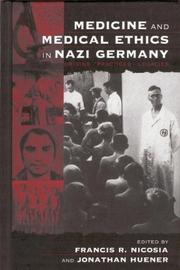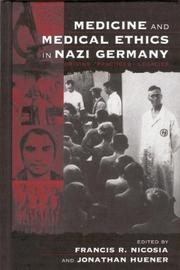| Listing 1 - 10 of 27 | << page >> |
Sort by
|
Book
ISBN: 1316213404 1316213625 1316215857 1316215652 1316215237 1107664810 1107589673 1316214834 131621544X 1316215032 110706712X 1322293570 9781316215036 9781316215449 9781107589674 9781107067127 9781107664814 Year: 2014 Publisher: Cambridge : Cambridge University Press,
Abstract | Keywords | Export | Availability | Bookmark
 Loading...
Loading...Choose an application
- Reference Manager
- EndNote
- RefWorks (Direct export to RefWorks)
This book considers the evolving strategic interests and foreign policy intent of the Third Reich toward the Arabic-speaking world, from Hitler's assumption of power in January 1933 to 1944, a year following the final Axis defeat in and expulsion from North Africa in May 1943. It does so within the context of two central, interconnected issues in the larger history of National Socialism and the Third Reich, namely Nazi geopolitical interests and ambitions and the regime's racial ideology and policy. This book defines the relatively limited geopolitical interests of Nazi Germany in the Middle East and North Africa within the context of its relationships with the other European great powers and its policies with regard to the Arabs and Jews who lived in those areas.
National socialism and Islam. --- Islam and national socialism --- Islam --- Arab countries --- Germany --- Alemania --- Ashkenaz --- BRD --- Bu̇gd Naĭramdakh German Uls --- Bundesrepublik Deutschland --- Deutsches Reich --- Deutschland --- Doitsu --- Doitsu Renpō Kyōwakoku --- Federal Republic of Germany --- Federalʹna Respublika Nimechchyny --- FRN --- German Uls --- Germania --- Germanii︠a︡ --- Germanyah --- Gjermani --- Grossdeutsches Reich --- Jirmānīya --- KhBNGU --- Kholboony Bu̇gd Naĭramdakh German Uls --- Nimechchyna --- Repoblika Federalin'i Alemana --- República de Alemania --- República Federal de Alemania --- Republika Federal Alemmana --- Vācijā --- Veĭmarskai︠a︡ Respublika --- Weimar Republic --- Weimarer Republik --- ХБНГУ --- Германия --- جرمانيا --- ドイツ --- ドイツ連邦共和国 --- ドイツ レンポウ キョウワコク --- Germany (East) --- Germany (Territory under Allied occupation, 1945-1955) --- Germany (Territory under Allied occupation, 1945-1955 : British Zone) --- Germany (Territory under Allied occupation, 1945-1955 : French Zone) --- Germany (Territory under Allied occupation, 1945-1955 : Russian Zone) --- Germany (Territory under Allied occupation, 1945-1955 : U.S. Zone) --- Germany (West) --- Holy Roman Empire --- Arab world --- Arabic countries --- Arabic-speaking states --- Islamic countries --- Middle East --- Foreign relations --- Deguo --- 德国 --- Gėrman --- Герман Улс
Book
ISBN: 9780765806246 Year: 2013 Publisher: New Brunswick, N.J. Transaction Publishers
Abstract | Keywords | Export | Availability | Bookmark
 Loading...
Loading...Choose an application
- Reference Manager
- EndNote
- RefWorks (Direct export to RefWorks)
International relations. Foreign policy --- History of Germany and Austria --- anno 1930-1939 --- anno 1940-1949 --- Germany --- Palestine
Book
ISBN: 0824054865 Year: 1990 Publisher: New York London Garland
Abstract | Keywords | Export | Availability | Bookmark
 Loading...
Loading...Choose an application
- Reference Manager
- EndNote
- RefWorks (Direct export to RefWorks)
Digital
ISBN: 9781107589674 Year: 2014 Publisher: Cambridge Cambridge University Press
Abstract | Keywords | Export | Availability | Bookmark
 Loading...
Loading...Choose an application
- Reference Manager
- EndNote
- RefWorks (Direct export to RefWorks)

ISBN: 1571813861 157181387X Year: 2004 Publisher: New York, N.Y. Berghahn
Abstract | Keywords | Export | Availability | Bookmark
 Loading...
Loading...Choose an application
- Reference Manager
- EndNote
- RefWorks (Direct export to RefWorks)
Medicine --- Medical ethics --- World War, 1939-1945 --- National socialism --- Médecine --- Ethique médicale --- 2ème guerre mondiale --- Nazisme --- History --- Atrocities. --- Moral and ethical aspects. --- Histoire --- Atrocités --- Aspect moral --- Germany --- Allemagne --- History of Germany and Austria --- anno 1940-1949
Book
Year: 1994 Publisher: Vermont Saint Michael's College
Abstract | Keywords | Export | Availability | Bookmark
 Loading...
Loading...Choose an application
- Reference Manager
- EndNote
- RefWorks (Direct export to RefWorks)

ISBN: 085745692X 157181387X Year: 2008 Publisher: New York : Berghahn Books,
Abstract | Keywords | Export | Availability | Bookmark
 Loading...
Loading...Choose an application
- Reference Manager
- EndNote
- RefWorks (Direct export to RefWorks)
The participation of German physicians in medical experiments on innocent people and mass murder is one of the most disturbing aspects of the Nazi era and the Holocaust. Six distinguished historians working in this field are addressing the critical issues raised by these murderous experiments, such as the place of the Holocaust in the larger context of eugenic and racial research, the motivation and roles of the German medical establishment, and the impact and legacy of the eugenics movements and Nazi medical practice on physicians and medicine since World War II. Based on the authors
Medicine --- Medical ethics --- World War, 1939-1945 --- National socialism --- History --- Atrocities. --- Moral and ethical aspects.

ISBN: 0857457004 184545359X Year: 2007 Publisher: New York : Berghahn Books,
Abstract | Keywords | Export | Availability | Bookmark
 Loading...
Loading...Choose an application
- Reference Manager
- EndNote
- RefWorks (Direct export to RefWorks)
Culture and the arts played a central role in the ideology and propaganda of National Socialism from the early years of the movement until the last months of the Third Reich in 1945. Hitler and his followers believed that art and culture were expressions of race, and that "Aryans" alone were capable of creating true art and preserving true German culture. This volume's essays explore these and other aspects of the arts and cultural life under National Socialism, and are authored by some of the most respected authorities in the field.
Book
ISBN: 1282662554 9786612662553 1845459792 1845456769 9781282662551 9781845459796 Year: 2010 Publisher: New York : Berghahn Books,
Abstract | Keywords | Export | Availability | Bookmark
 Loading...
Loading...Choose an application
- Reference Manager
- EndNote
- RefWorks (Direct export to RefWorks)
German Jews faced harsh dilemmas in their responses to Nazi persecution, partly a result of Nazi cruelty and brutality but also a result of an understanding of their history and rightful place in Germany. Their gradual pauperization, the imposed separation from the larger society and culture of their native Germany, and the consequent humiliation and isolation were bitter blows. This volume addresses the impact of the anti-Jewish policies of Hitler's regime on Jewish family life, Jewish women, and the existence of Jewish organizations and institutions and considers some of the Jewish responses
Jews --- History --- Social conditions --- Government policy --- Persecutions --- Legal status, laws, etc. --- Germany --- Politics and government --- Ethnic relations
Multi
ISBN: 9780857456922 085745692X Year: 2008 Publisher: New York : Berghahn Books,
Abstract | Keywords | Export | Availability | Bookmark
 Loading...
Loading...Choose an application
- Reference Manager
- EndNote
- RefWorks (Direct export to RefWorks)
The participation of German physicians in medical experiments on innocent people and mass murder is one of the most disturbing aspects of the Nazi era and the Holocaust. Six distinguished historians working in this field are addressing the critical issues raised by these murderous experiments, such as the place of the Holocaust in the larger context of eugenic and racial research, the motivation and roles of the German medical establishment, and the impact and legacy of the eugenics movements and Nazi medical practice on physicians and medicine since World War II. Based on the authors
History --- Medicine --- Medical ethics --- World War, 1939-1945 --- National socialism --- Atrocities. --- Moral and ethical aspects.
| Listing 1 - 10 of 27 | << page >> |
Sort by
|

 Search
Search Feedback
Feedback About UniCat
About UniCat  Help
Help News
News